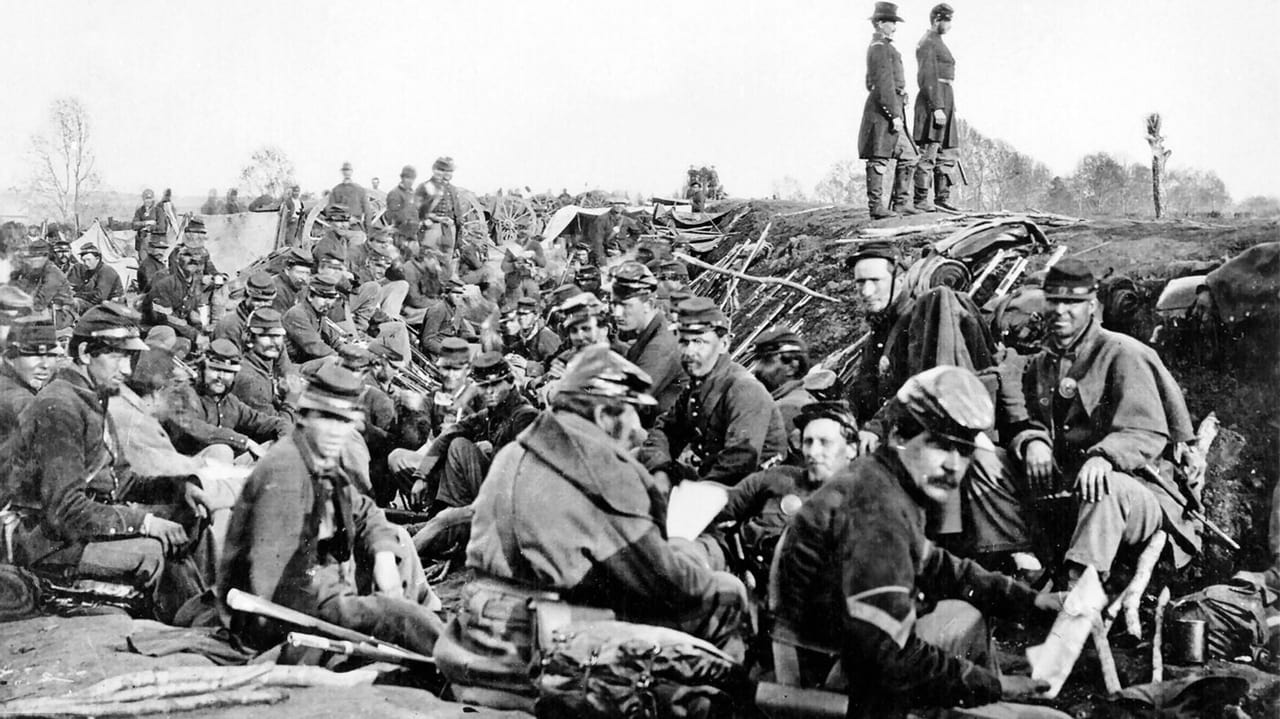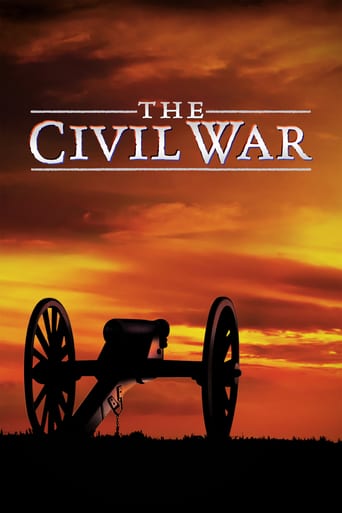Interesteg
What makes it different from others?
Blucher
One of the worst movies I've ever seen
Phonearl
Good start, but then it gets ruined
AshUnow
This is a small, humorous movie in some ways, but it has a huge heart. What a nice experience.
zkonedog
Ken Burns' epic documentary about the Civil War is perhaps the greatest and most all- encompassing history lesson of the North/South conflict that has ever been put on film or page. Not only is every important detail of the war covered (and in such a way that the details are interesting and important, not boring), but two entire episodes are devoted to the build-up and aftermath of the conflict. Essentially, if you were teaching a class on the Civil War, this video is all you would need, as it both conveys the vital information of the war, and does so in a way that doesn't stagnate. In essence, a very tight, well-produced series.The only reason I give this set four stars out of five, though, is that it lacks (althouht through no fault of its own) the emotional punch of Burns' more recent "The War" (World War II) series. Such things as personal interviews and live video could obviously not be obtained from the 1860s, but the reading of letters and still photographs doesn't quite measure up. The best example I can give of this is that while watching the Civil War series I found myself treating it as one extended history class session, while "The War" was almost more of a dramatic event (what with the live interviews and video footage).So, although the Civil War documentary by Ken Burns is a brilliant work of research and cinematography, I can only give it a four-star rating due to its lacks of live video footage or emotionally moving personal interviews. I do, however, strongly recommend this series to anyone wanting to learn a bit more about the most brutal war in United States history. You may not need the tissue box while watching this series (unlike "The War"), but I guarantee you will come away with a much more solid understanding of the events that caused, prolonged, and ended the American Civil War.
Dr Jacques COULARDEAU
This film, or series since it has nine episodes, is crucial for people, particularly young people and people outside the USA, to understand the nature of the Union behind the USA and why this Civil War was the real corner stone of US history. We always refer to the Declaration of Independence and the US Constitution but we forget a simple fact: the USA is a centralized country that has mapped the various political fields between the federal government and the various states. The US Constitution itself clearly states that all competences or fields of political action that are not attributed to the federal administration can only be dealt with at state level. Recent US Supreme Court cases have shown that this principle is basic. For example the US Supreme court intervened in the case of gay rights because the 14th Amendment to the US Constitution was negated by some legislative rulings in some states, particularly cases that crossed the border between several states. And it is the reassertion of the 14th amendment stating all Americans are equal in front of all public agencies or services and that they all deserve equal protection against the negation of their equal rights that enabled the sweeping generalization of the opening of marriage rights to any couple whatsoever since it could only be solved at state level since it is not a competence of the federal state, both the government and Congress. That's why the Defense of Marriage Act was repealed by the Supreme Court since it was beyond the competence of Congress.This being said we can now understand why secession could not take place and could not be accepted on the basis of the US Constitution. If a state wants to get out of the Union it has to negotiate it with the Federal State, both government and Congress. It cannot secede on its own initiative and under its own authority. What is surprising is that the war started on that argument in the north: self-declared secession is illegal and anti-constitutional. So it has to be fought against including with military might. And yet it could not be won on that single argument because it was a lie. What was at stake was the principle of the equality of all Americans including the Blacks. For the south the Blacks were slaves and as such not Americans and certainly not citizens. So for southerners they could not be considered as equal because they were not human. For northerners the Blacks were human beings and had to be considered as equal because they were created by God the same way as the Whites. Note the reference to God and creation in the declaration of Independence is bothering since it refers to one particular ideology, religion, that is always under the control of churches and both democracy and hierarchical organization in these churches can easily make the racial problem a religious problem. We must remember that in the south Blacks were excluded from churches and were even excluded from religion. That was the main difference between English colonization and French or Spanish colonization. Actually we could consider the film is timid about this religious question. It sure considers the racial side of the war and the crucial emancipation of Black slaves, but it does not really consider the fact for instance that Louisiana went back into the Union rather early in the war because of the French tradition that had left behind a vast community of free Blacks and mulattos and a religious tradition with the Catholic Church that integrated the slaves into their religious rites and practices from the very start. Code Noir was a colonial tool for sure but all religious rights were asserted and recognized by it, including the obligation for slaves to be married and the obligation for slave owners to provide every week a day for matrimonial duties if the two members of the married couple were not on the same plantation. And the vote of Louisiana was crucial to ratify the 13th Amendment to the US Constitution and the vote of this Amendment with a one vote majority (two third majority mind you) is not even mentioned in any detail.In fact the film insists too much on the opposition in the north against this racial development in the war which left the 55% majority of Lincoln in the 1864 election unexplained. It is quite obvious that the racial dimension was crucial and positive in the north. But that is not the first time the racial question is under-estimated. Even by 1990 when this film came out. But since then many examples can be quoted of this persistent under-estimation of the crucial character of the racial question; In 2012 for example practically all opinion polls announced Obama as defeated because they considered the Latinos as white, which they are, but they forgot that these white Latinos were not going to vote the same way as European whites, and they did not vote the same way as European whites so providing a majority to Obama. On another side the film insists a lot on the gory character of this war. It was absolutely horrible but that was the fate of all wars in the 19th century. Napoleon's wars were particularly bloody too. Dying of sickness or starvation as fighting soldiers as well as prisoners on both sides was common place, and too often both sides forgot to take prisoners or to collect the wounded from the battle field after battles. At times too the film insists too much on "facts" or "events" and does not see and mention the historical perspective. It is too easy to just mention the industrial development of the north and the blockade against the south but that was not the only dimension, or it was too circumstantial. [...]Dr Jacques COULARDEAU
Joe Paris
Through this episode of Ken Burns' series The Civil War, I was afforded a glimpse at what seems to be a splendid documentary of the war between the states. Burns first focuses on analyzing the lives and mannerisms of the war's duo of prominent opposing generals, U.S. Grant and Robert E. Lee. He does this to a very pleasant extent of thoroughness, and qualifies both generals as outstanding and respectable men. He then went on to examine the stalemate that these two engaged in while trying to outflank each other for control of the strategically paramount location of the Confederate Capitol, Richmond. While doing this, he spends time to respect the horrendous conditions of battle during the war between the states, specifically at the battle of Chancellorsville. He further analyzes the atrocious effects of the war by discussing the conditions in which the wounded were held, many to their mortal termination. This is a very informative and engaging documentary.
grantss
The greatest documentary series ever made.Incredibly well researched, superbly narrated, insightful interviews. When I first watched the series, I didn't know much about the American Civil War. The series made me want to find out more as it showed the what for it was – the higher ideal. Of course, it also showed the military strategy nd tactics, but it showed a lot more than that. It showed the causes of it, the impacts on everyday people as well as senior politicians and generals. Plus it showed the ramifications of it.Over the years I have watched the series many more times. As my knowledge of the Civil War has grown, you would expect my enjoyment of the series to diminish. Not the case. Greater knowledge makes you appreciate the series even more, as you realise how much there is to know, and how they managed to condense it into such an entertaining series without straying from the truth or dumbing it down.Just having those prominent historians explain certain things is enthralling. Moreover, the impact of the gravitas of David McCullough's narration cannot be understated. Just hearing him say "The line held" is spine-tingling, and very emotional.A brilliant series.

